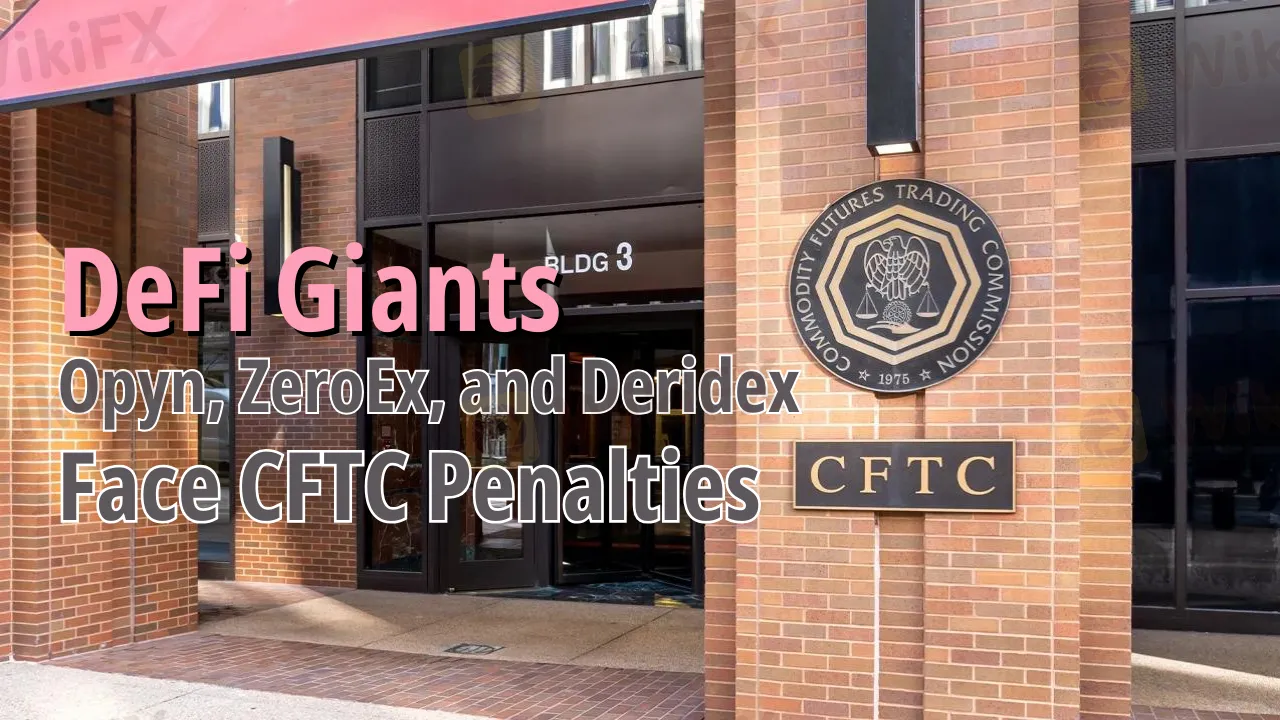简体中文
繁體中文
English
Pусский
日本語
ภาษาไทย
Tiếng Việt
Bahasa Indonesia
Español
हिन्दी
Filippiiniläinen
Français
Deutsch
Português
Türkçe
한국어
العربية
DeFi Giants Opyn, ZeroEx, and Deridex Face CFTC Penalties
Abstract:DeFi leaders Opyn, ZeroEx, and Deridex face CFTC enforcement actions for various violations, highlighting regulatory scrutiny in the decentralized finance realm. Stay informed with the latest in forex through the WikiFX App.

In the ever-evolving world of decentralized finance (DeFi), three major players - Opyn, ZeroEx, and Deridex - have recently been handed enforcement actions by the Commodity Futures Trading Commission (CFTC). These companies have been charged with several violations, emphasizing the CFTC's continuous scrutiny of the DeFi landscape.
The Charges and Penalties
Both Deridex and Opyn are facing penalties for failing to register as a swap execution facility (SEF) or designated contract market (DCM). Furthermore, they were charged for not adopting a customer identification program, which is part of the Bank Secrecy Act compliance program for futures commission merchants (FCMs). ZeroEx, alongside the other two, also faces charges for unlawfully offering leveraged and margined retail commodity transactions in digital assets.

As a consequence, the three firms have been mandated to pay civil monetary penalties. Opyn is set to pay $250,000, ZeroEx will pay $200,000, and Deridex owes $100,000. They are also mandated to halt any violations of the Commodity Exchange Act (CEA) and CFTC regulations.
Deep Dive: The Companies and Their Operations
Opyn, Inc. had launched the Opyn Protocol which facilitated the trading of a digital asset derivative token called oSQTH. This token's value was pegged to an index (Squeeth) that tracked the square of ether's price relative to the USDC stablecoin. The issue arose when it was determined that these tokens acted as swaps and leveraged retail commodity transactions. The CFTC stated that such transactions can only be presented to retail users through a registered exchange. Opyn also did not sufficiently block U.S. users from accessing its protocol.

Deridex, Inc. operated a blockchain-based protocol offering “perpetual contracts.” These contracts can be termed as swaps and, similar to Opyn's issue, must only be offered on a registered exchange. Deridex also took no precautions to exclude U.S. citizens from accessing its protocol.

ZeroEx Inc. on the other hand, introduced a protocol and a front-end application (Matcha) that allowed users to trade digital assets on multiple blockchains. Some of these digital assets provided traders with approximately 2:1 leveraged exposure to renowned digital assets like ether and bitcoin. This was in direct violation of CFTC regulations.

Bright Side of Cooperation
Despite the hefty penalties, the CFTC acknowledged the cooperation extended by all three companies during the Division of Enforcement's investigation. This proactive stance from the firms resulted in a reduction of their respective civil monetary penalties.
For those keen on staying updated with the latest happenings in the forex market, consider installing the WikiFX App. With the DeFi landscape continuously evolving, it's essential to remain informed, ensuring that both investments and operations align with regulatory requirements.
Download the App here: https://www.wikifx.com/en/download.html

Disclaimer:
The views in this article only represent the author's personal views, and do not constitute investment advice on this platform. This platform does not guarantee the accuracy, completeness and timeliness of the information in the article, and will not be liable for any loss caused by the use of or reliance on the information in the article.
Read more

US Federal Reserve May Cut Interest Rates in September, Says Goldman Sachs
US Federal Reserve Chair Jerome Powell may slash the policy rate in September 2025, according to research economists at Goldman Sachs. Read this to learn more.

Monzo Fined £21M: FCA Slams Bank Over High-Risk Accounts Breach
The FCA fines Monzo £21M for anti-money laundering failures, citing high-risk account breaches and systemic control failures. Discover Monzo’s response and improvements.

Breaking News: Trump Announces 50% Import Tariff on Copper and 200% on Pharma
US President Donald Trump has announced a 50% tariff on copper and copper product imports to the country. He further warned that the import duty on pharmaceuticals can rise up to 200%. Read this to know more details.

How Likely Is a Federal Reserve Rate Cut in September?
Goldman Sachs updates its forecast for a Federal Reserve rate cut in September, highlighting inflation trends, job market shifts, and the impact of China tariffs.
WikiFX Broker
Latest News
Global stock markets are calling Trump's bluff on tariffs
Trump's tariffs overshadow the pomp and pageantry as Macron meets King Charles
Boeing delivers most airplanes since late 2023 after ramping up 737 Max output
Inflation expectations drift back down to pre-tariff levels, New York Fed survey shows
10 Unlicensed Brokers Exposed – Check Now to Stay Safe!
Exposed: Ibell Markets - A Scam Broker That Does Not Allow Withdrawals
Gold Prices to Fluctuate This Week Amid July 9 Tariff Deadline, Fed Policy
America's Deficit Reckoning: How the U.S. debt spiral could spark a crisis
Treasury yields hold steady as Trump extends tariff deadline
Asia-Pacific markets mostly rise as investors assess Trump's steep tariffs
Currency Calculator


